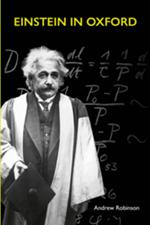Albert Einstein visited Oxford in 1931, to receive an honorary degree and to lecture on relativity and the Universe. While lecturing, he naturally chalked equations and diagrams on several blackboards. One of these is today the most popular object in Oxford’s History of Science Museum. Yet Einstein tried to prevent its preservation because he was modest about his legendary status. Having failed, he complained to his diary: ‘Not even a cart-horse could endure so much!’ Nevertheless, he came back to Oxford in 1932 and again in 1933 now as a refugee from Nazi Germany. In many ways, the city appealed deeply and revealed him at his most charismatic, as he participated in its science, music and politics, and wandered its streets alone. While staying in college rooms once occupied by the mathematician and writer Lewis Carroll, author of Alice’s Adventures in Wonderland, he wrote a rhymed German poem now kept in the Bodleian Library describing himself as an old ‘hermit’ and a roaming ‘barbarian’. His diary entries, alongside observations from the people he met such as the future novelist William Golding also reveal his unique sense of humour. Einstein and 1930s Oxford were exquisitely matched and ill-matched, as the intimate and unfamiliar stories in this book reveal, thereby casting light on why Einstein continues to be the world’s most famous scientist.

Einstein in Oxford
ISBN: 9781851246380
Format: Hardback
Publisher: Bodleian Library (ADS)
Origin: GB
Release Date: September, 2024


